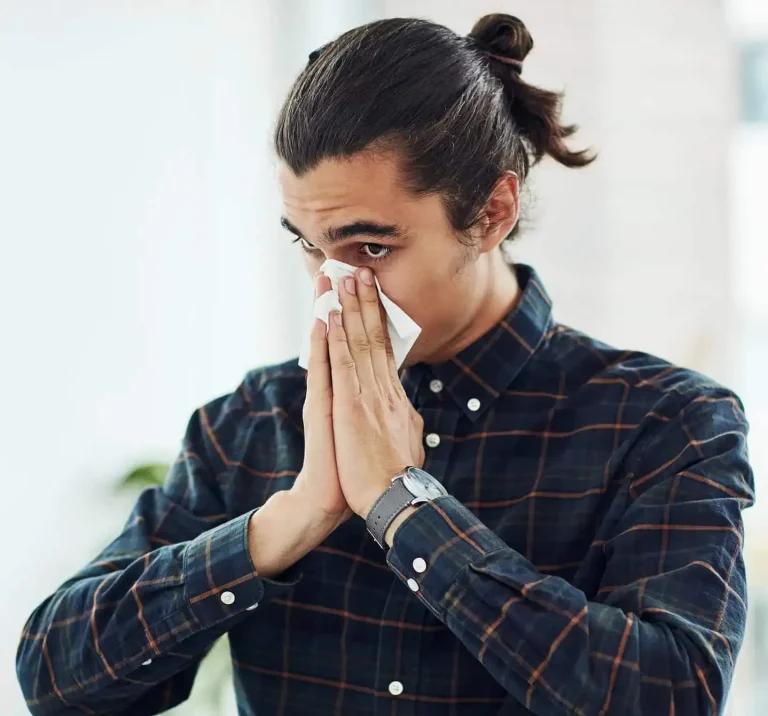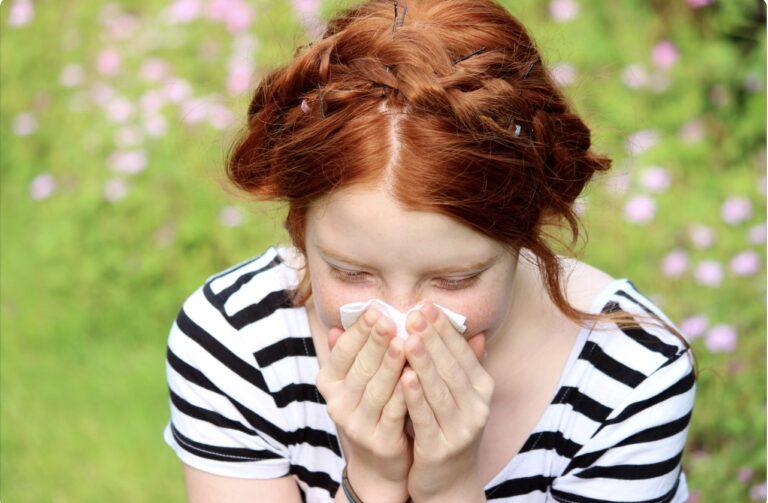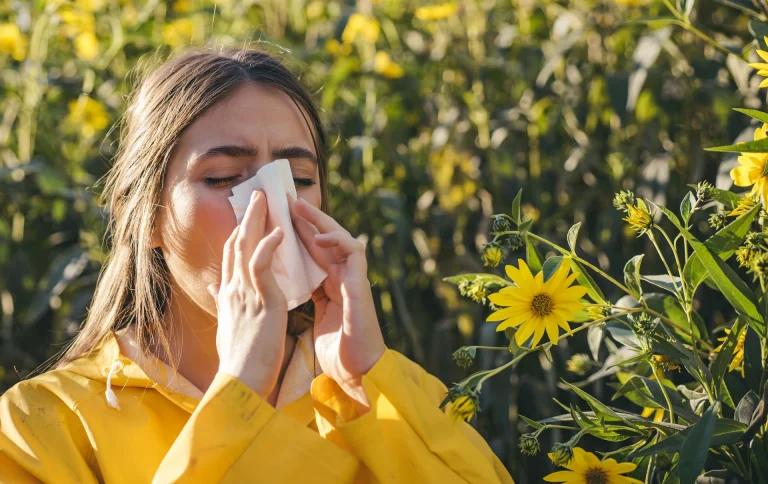Navigating allergies can be a daunting task, especially when it comes to understanding the relationship between hay fever and hives. As a common occurrence, many individuals find themselves grappling with the uncomfortable and often confusing symptoms that arise from this connection. We will look into the details of this condition, exploring the underlying causes, diagnostic approaches, and effective management strategies to help you find relief and regain control over your allergy-related health.
Understanding hay fever and hives
Hay fever, also known as allergic rhinitis is a seasonal allergy. It is an allergic reaction that occurs when the immune system reacts to harmless airborne particles, such as pollen, mold, or pet dander. This overreaction triggers the release of histamine, a chemical that causes common symptoms of hay fever, including sneezing, nasal congestion, and itchy watery eyes.
Hives, also known as urticaria, on the other hand, are a skin condition characterized by the sudden appearance of raised, red welts or patches that can be accompanied by intense itching. While hay fever and hives may seem like distinct conditions, they are often interconnected, with the potential for one to trigger or exacerbate the other.
The link between hay fever and hives
The relationship between hay fever and hives lies in the common underlying mechanism of the immune system’s response to allergens. When the body encounters an allergen, it releases histamine and other inflammatory chemicals, which can lead to the development of both hay fever and hive-like symptoms.
In some cases, the histamine released during a hay fever episode can cause a skin reaction that becomes irritated and inflamed, resulting in the appearance of hives. Conversely, the stress and discomfort associated with dealing with hay fever symptoms can also trigger the immune system to overreact, leading to the development of hives.
It’s important to note that not everyone with hay fever will experience hives, and not all cases of hives are directly linked to hay fever. However, the potential for these two conditions to coexist and exacerbate one another is a crucial consideration for individuals seeking effective relief.
Diagnosing the connection
Identifying the underlying cause of hives can be a complex process, as there are numerous potential triggers, including food allergies, medications, and environmental factors. When it comes to determining if hay fever is the culprit, healthcare providers may employ a combination of the following diagnostic approaches:
Medical history and physical examination
Your healthcare provider will start by taking a detailed medical history, asking about your symptoms, the timing and frequency of hive outbreaks, and any potential triggers. They will also carry out a thorough physical examination to assess the appearance and characteristics of the hives.
Allergy testing
Allergy testing, such as skin prick tests or blood tests, can help identify the specific allergens that are triggering your hay fever and potentially contributing to the development of hives. These tests can provide valuable insights into the underlying cause of your symptoms, guiding the development of an effective treatment plan.
Elimination diets
In some cases, your healthcare provider may recommend an elimination diet to rule out food allergies as a potential trigger for your hives. This involves temporarily removing certain foods from your diet and then gradually reintroducing them to see if they elicit a reaction.
Ruling out other causes
Your healthcare provider will also work to rule out other potential causes of hives, such as infections, medications, or underlying medical conditions, to ensure the correct diagnosis is made.
By combining these diagnostic tools, your healthcare provider can help you determine if hay fever is the primary driver of your hive-like symptoms, allowing for targeted and effective treatment.
Managing hay fever-induced hives
Once the connection between hay fever and hives has been established, the focus shifts to managing both conditions. This may involve a combination of the following strategies:
Allergen avoidance
One of the most effective ways to manage hay fever-induced hives is to identify and avoid the specific allergens that trigger your symptoms. This may involve taking steps such as:
- Keeping windows closed and using air conditioning during high pollen seasons
- Regularly cleaning your living spaces to reduce exposure to dust mites, pet dander, and other indoor allergens
- Wearing a mask or using a HEPA air purifier when engaging in activities that may expose you to outdoor allergens
- Stay informed about pollen counts and forecasts, which can help individuals plan their activities and dietary choices accordingly. Apps and online resources can provide real-time pollen data, allowing hayfever sufferers to be better prepared
- Maintain good nasal hygiene, such as using saline rinses or nasal sprays, to help clear out pollen and reduce inflammation in the sinuses. Over-the-counter antihistamines and decongestants can also provide relief for hay fever symptoms
Medication management
Your healthcare provider may prescribe a combination of medications to help alleviate the symptoms of both hay fever and hives. These may include:
- Antihistamines: Fexofenadine and diphenhydramine are medications that block the release of histamine, reducing the inflammatory response that leads to hives and other allergy symptoms
- Corticosteroids: These anti-inflammatory drugs can help reduce swelling and itching associated with hives
- Leukotriene inhibitors: These medications target the chemical mediators involved in the allergic response, providing relief for both hay fever and hive-related symptoms
If your allergy is severe, you may have a serious reaction called anaphylaxis. Some cases could be life-threatening and may need an emergency shot of epinephrine (adrenaline).
Immunotherapy
For individuals with persistent or severe hay fever-induced hives, immunotherapy (allergy shots or sublingual immunotherapy) may be a viable treatment option. This approach involves gradually exposing the body to increasing amounts of the offending allergen, helping the immune system build tolerance and reducing the severity of future reactions.
Lifestyle modifications
In addition to medical interventions, making certain lifestyle adjustments can also help manage hay fever-induced hives. These may include:
- Practicing stress management techniques, as stress can exacerbate both hay fever and hive symptoms
- Maintaining a healthy diet rich in antioxidants and anti-inflammatory foods
- Engaging in regular physical activity to support overall immune function
Seeking professional guidance
Navigating the complexities of hay fever and hives can be a daunting task, and it’s crucial to seek the guidance of a healthcare professional, such as an allergist or dermatologist, to ensure proper diagnosis and effective management.
These specialists have the expertise to accurately identify the root cause of your symptoms, rule out other potential triggers, and develop a personalized treatment plan that addresses both your hay fever and hive-related concerns.
Conclusion
The interplay between hay fever and hives is a complex and often confusing aspect of allergic health. By understanding the underlying mechanisms, seeking professional guidance, and implementing a comprehensive management plan, individuals can navigate this challenge and find relief from the disruptive symptoms that can arise from this interconnected condition.
Remember, you don’t have to face this journey alone. With the right support and a proactive approach, you can take control of your allergies and reclaim your quality of life.
Sources
Medical Disclaimer
NowPatient has taken all reasonable steps to ensure that all material is factually accurate, complete, and current. However, the knowledge and experience of a qualified healthcare professional should always be sought after instead of using the information on this page. Before taking any drug, you should always speak to your doctor or another qualified healthcare provider.
The information provided here about medications is subject to change and is not meant to include all uses, precautions, warnings, directions, drug interactions, allergic reactions, or negative effects. The absence of warnings or other information for a particular medication does not imply that the medication or medication combination is appropriate for all patients or for all possible purposes.









